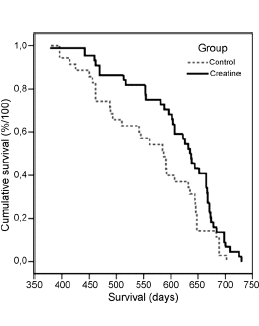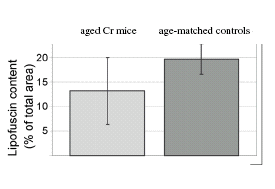|
Creatine extends lifespan of mice
Creatine extends the healthy lifespan of mice by ten percent, according to researchers at the German National Research Center for Environment and Health in Neurobiology of Aging.
Study
The researchers fed one-year-old mice a diet that contained one percent creatine. A control group was given normal food. The researchers then noted the age the mice reached. Mice normally live to be about two years old.
Results
Below you can see the effect of creatine on the lifespan of the animals.

The researchers used female mice for their experiment. Female organisms age less quickly than male ones. The researchers expect that they therefore obtained greater effects than they would have done if they had used male animals.
The healthy lifespan increased by nine percent in those that received a creatine supplement. The mice in the control group had an average of 563 healthy days of life, whereas the mice in the creatine group had 613.
The researchers got the idea for the experiment after promising animal studies were carried out in which the lifespan of mice with Parkinson's and Huntington's disease was extended as a result of creatine. They wondered whether creatine would also protect the brains of healthy mice against aging.
When brains – and not only brains – age, the amount of the 'aging pigment' lipofuscin in the brain tissue increases. Lipofuscin is therefore a marker for aging. The Germans discovered that the hippocampus of the mice in the creatine group contained less lipofuscin.

The hippocampus consists of delicate tissue that plays an important role in recording new information. The effect may explain why the mice in the creatine group had a better memory in old age than the mice in the control group. The elderly creatine mice were also physically more active and became familiar with their surroundings more quickly when the researchers placed them in a new cage.
Conclusion
The researchers are enthusiastic about their study. "As there are no real safety concerns, creatine might have the potential to contribute to healthy human aging", they conclude.
Sources:
Neurobiol Aging. 2008 Sep;29(9):1404-11.
|